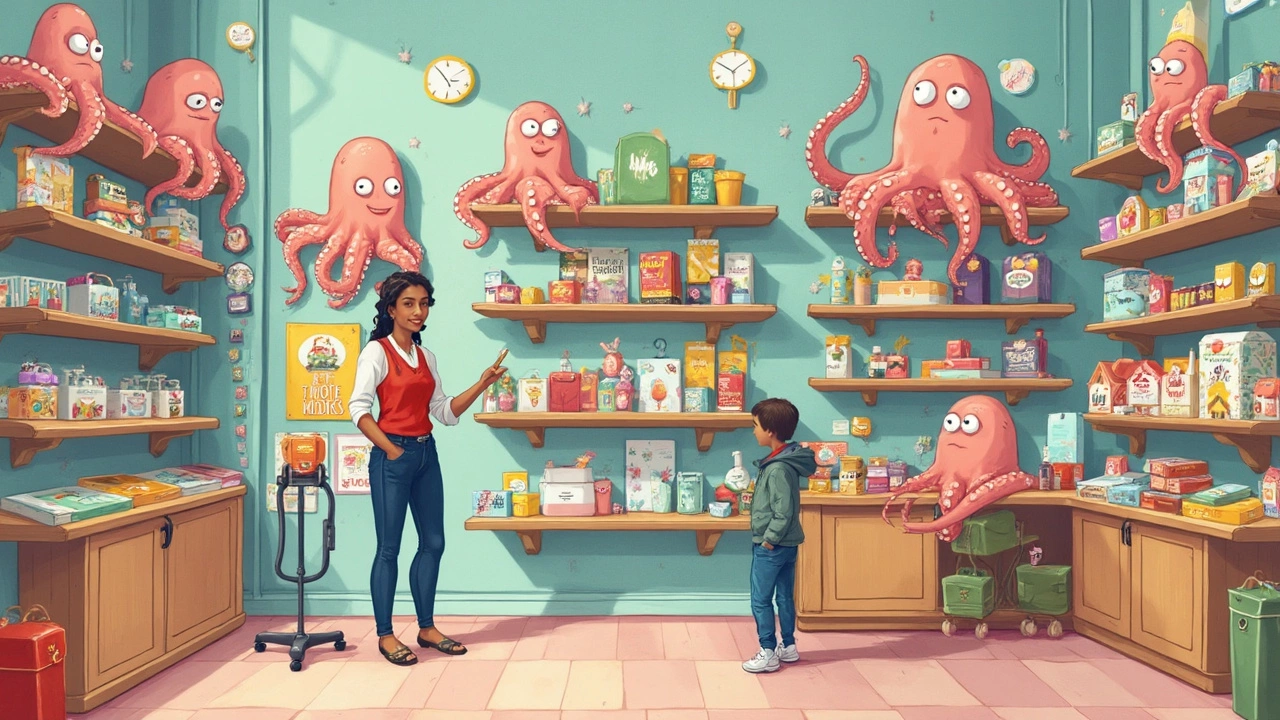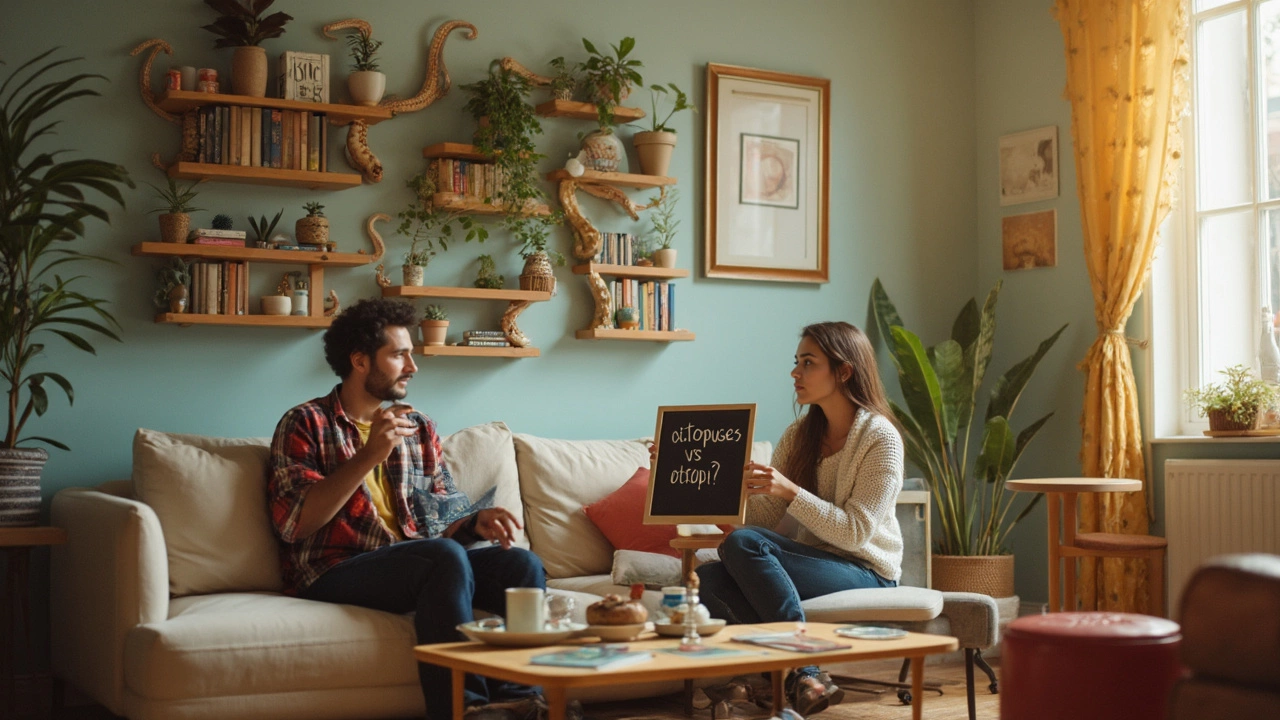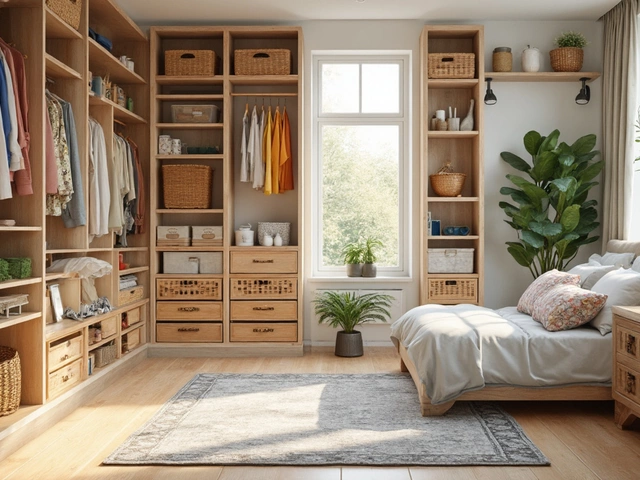So, you’re staring at that cute octopus-shaped shelf in your living room, and suddenly, the question hits you. If you buy another one, do you have two octopuses? Or is it octopi? Most people feel awkward saying either, and sellers struggle labeling their quirky storage pieces. Turns out, you’re not alone—this is a classic grammar debate that’s surprisingly relevant to shelving fans.
The real answer? It’s actually “octopuses.” English grammar experts prefer this version, since “octopus” comes from Greek, not Latin. “Octopi” sounds fancier, but it’s technically off. The third, less-heard “octopodes” is just overkill and will make your friends pause mid-conversation.
Getting the word right might sound nerdy, but it comes up more than you’d think. If you’re searching online, writing labels, or selling in a shop, mixing up the plurals will mess with your results. No one likes clicking through endless listings for ‘octopi shelf’ only to realize half of them are fish tanks.
- The Plural Problem: Octopuses or Octopi?
- Why Your Plural Choice Matters for Shelving
- Labeling and Selling Octopus Shelves
- Fun Octopus Facts for Your Shelf Style
- Tips for Organizing with Octopus Shelves
The Plural Problem: Octopuses or Octopi?
It’s a mouthful, right? When you’re talking about more than one octopus, the first instinct is to say “octopi.” Thanks, high school Latin. But here’s the catch: octopus isn’t a Latin word—it comes from Greek. In plain English, the correct plural is octopuses.
Every major dictionary, including Oxford and Merriam-Webster, puts “octopuses” as the top option. “Octopi” sneaks in as a backup, but it’s labeled as incorrect by plenty of language pros. “Octopodes” tries to match Greek rules, but let’s be real, you probably don’t want to say that out loud in the store when you’re hunting for new octopus shelves.
Here’s a quick cheat sheet:
- Octopuses – Right in English, clear for labeling, searching, and talking.
- Octopi – Pops up sometimes, but experts say skip it.
- Octopodes – Super rare, just confuses people.
And if you’re thinking all this grammar stuff doesn’t matter, it actually does if you’re searching for octopus shelving or buying octopus shelves online. Using the right word means you’ll find what you want faster and help others find your product listings or design ideas. Simple as that. No one wants a search result full of jellyfish plushies when they’re looking for a new, cool shelving piece.
| Word | Origin | Used By Experts? |
|---|---|---|
| Octopuses | English/Greek | Yes |
| Octopi | Latin (incorrect for octopus) | No |
| Octopodes | Greek (rare form) | Not common |
Next time you’re chatting about your weird and wonderful octopus shelves, go ahead and say “octopuses.” You’ll sound smart, and you’ll save everyone a little confusion.
Why Your Plural Choice Matters for Shelving
Choosing the right plural for "octopus" isn’t just a grammar question—it makes a real difference when you’re dealing with octopus shelves or searching for storage ideas. If you walk into a store or browse online with the word “octopi shelves” in your search, you might get totally different results than if you typed “octopuses shelves.” Some stores label their shelving by what people are most likely to type, so using the right word saves you time.
Here’s the catch: most big retail sites (think Amazon, IKEA, even Etsy) stick with “octopuses” for their product names or categories. Search algorithms are picky—one wrong word and you might miss out on the shelf of your dreams. Plus, if you’re labeling your own storage in a shop or on a resale app, you want your posts to show up for the most people.
- “Octopuses” brings up more relevant results in home décor and shelving searches.
- Vendors use “octopuses” because it’s technically right, but also because that’s what customers type.
- Schools and libraries stocking themed furniture usually go by “octopuses” to avoid confusing students or buyers.
If you’ve ever tried selling quirky furniture, you know how annoying those picky filter searches can get. Use the correct term right from the start—it helps buyers find what they want and makes your own listings look a lot more professional.
Let’s look at a quick breakdown from a few popular shopping platforms on how items are tagged:
| Platform | Most Used Plural |
|---|---|
| Amazon | Octopuses |
| Etsy | Octopuses |
| Wayfair | Octopuses |
So if you want your organization projects (or sales) to go smoothly, stick with “octopuses.” You’ll grab more attention and cut through that confusing search clutter.

Labeling and Selling Octopus Shelves
If you're making or selling those playful octopus shelves, what label do you slap on the box or the online listing? This isn't just a fussy grammar thing. Using the right plural actually helps your stuff get found when shoppers type in "octopuses," not "octopi." According to Google Trends, 'octopuses' gets searched at least twice as often as 'octopi' when people are looking for home decor items, so it pays off to get it right.
Settle on “octopus shelves” for your product name and use “octopuses” if you want to talk about more than one. Check out this simple table to clear up the options:
| Singular | Preferred Plural | Nope |
|---|---|---|
| octopus shelf | octopus shelves | octopi shelves, octopodes shelves |
Sticking with the mainstream spelling keeps things clear for customers and boosts your product’s searchability. If you’re writing a shelf description or a store listing, put the keyword plural of octopus somewhere in your copy. This helps your product pop up when folks are debating what to call it, or just hoping for quirky storage furniture.
Here are some quick tips for labeling your octopus shelves right:
- Use “octopus shelves” as your main product title.
- Add a quick line in your product details showing you know your grammar, like "Fun fact: The proper plural is 'octopuses.'"
- Stay clear of “octopi” or “octopodes” in labels, which can confuse shoppers searching online.
- Include both “octopus shelf” and “octopus shelves” in your tags or keywords for better reach.
Keeping it simple and accurate helps shoppers find exactly what they want—and lets you show off a bit of clever know-how at the same time.
Fun Octopus Facts for Your Shelf Style
Octopus-themed shelves aren’t just conversation starters—they connect your space to one of the coolest creatures on earth. If you ever want to sound clever at your next get-together or spice up a listing for your octopus shelves, here’s what you can share.
- Octopuses have three hearts. Two pump blood to the gills, and the third keeps it moving everywhere else.
- They’re escape artists. If your shelf is styled with a tiny octopus figurine, remember: a real octopus can squeeze through tiny gaps, sometimes as small as a coin.
- True story—octopus blood is blue, not red, because it uses copper to carry oxygen. Imagine that blue running through your living room centerpiece.
- They’re among the smartest invertebrates. Some can open jars, solve mazes, and even play with objects, so putting books or plants near your octopus shelf clue in visitors to this quirky intelligence.
- The plural, as you now know, is “octopuses,” though “octopi” still sneaks into pop culture. Make that a fun note on a label or sign—it’ll get people’s attention.
Want quick stats? Check out just how wild octopuses can get:
| Fun Fact | Detail |
|---|---|
| Average Lifespan | 1-3 years (most species) |
| Number of Species | Over 300 |
| Largest Species | Giant Pacific Octopus (up to 16 feet) |
| Arms per Octopus | 8 |
Sprinkle some of these facts on a product tag or next to your shelf, and you’ll not only make your shelving stand out, but you’ll also help visitors remember the right way to say “octopuses.”

Tips for Organizing with Octopus Shelves
Organizing your space with octopus shelves isn’t just fun—it’s actually practical, too. These playful designs aren’t only eye-catching; those tentacles and curves can help hold more than you’d think. If you’ve got one (or a whole wall of them), here’s how to keep your area neat and your style on point.
- Divide by function: Use different tentacles to store different items. For example, try books on one, plants on another, headphones or smartwatches on a third. This way, you won't just be tossing stuff wherever—each tentacle has a job.
- Keep your balance: Octopus shelves can look off-kilter if you pile everything on one side. Spread out your items to keep the shelf steady and the room balanced, both visually and literally. Nothing’s worse than a shelf tipping over, especially when it’s shaped like an octopus.
- Label the shelves: If you’re using multiple octopus shelves in a room—for kids’ toys, console controllers, or office supplies—simple labels or color-coded baskets can save a lot of confusion (and arguing over whose stuff goes where).
- Go vertical: The best thing about octopus shelves is that you can stack or mount them higher up on your wall. Use the extra tentacles for things you don’t need every day but want to display—like collectibles, photo frames, or souvenirs.
- Use for themed rooms: Octopus shelves fit perfectly in ocean-themed kids’ rooms, bathrooms, or cozy reading corners. Grouping three or more together gives a playful, unified look. Just make sure to secure each one safely into the wall—no one wants a tentacle coming loose.
If you’re worried about weight, a well-installed octopus shelf can usually hold between 10 to 20 pounds. Here’s a quick guide for common items:
| Item | Recommended Max Weight |
|---|---|
| Books | 8 lbs per tentacle |
| Plants | 5 lbs per tentacle |
| Gadgets | 3 lbs per tentacle |
Take a minute to dust the tentacles regularly so you don’t end up with cobwebs (ironic, right?). And don’t overcrowd—leave some spaces open so you can actually admire the quirky design. Octopus shelves help keep things tidy while making any room a lot more interesting.


